The AMD Zen and Ryzen 7 Review: A Deep Dive on 1800X, 1700X and 1700
by Ian Cutress on March 2, 2017 9:00 AM ESTBenchmarking Performance: CPU Rendering Tests
Rendering tests are a long-time favorite of reviewers and benchmarkers, as the code used by rendering packages is usually highly optimized to squeeze every little bit of performance out. Sometimes rendering programs end up being heavily memory dependent as well - when you have that many threads flying about with a ton of data, having low latency memory can be key to everything. Here we take a few of the usual rendering packages under Windows 10, as well as a few new interesting benchmarks.
Corona 1.3
Corona is a standalone package designed to assist software like 3ds Max and Maya with photorealism via ray tracing. It's simple - shoot rays, get pixels. OK, it's more complicated than that, but the benchmark renders a fixed scene six times and offers results in terms of time and rays per second. The official benchmark tables list user submitted results in terms of time, however I feel rays per second is a better metric (in general, scores where higher is better seem to be easier to explain anyway). Corona likes to pile on the threads, so the results end up being very staggered based on thread count.
Blender 2.78
For a render that has been around for what seems like ages, Blender is still a highly popular tool. We managed to wrap up a standard workload into the February 5 nightly build of Blender and measure the time it takes to render the first frame of the scene. Being one of the bigger open source tools out there, it means both AMD and Intel work actively to help improve the codebase, for better or for worse on their own/each other's microarchitecture.
LuxMark
As a synthetic, LuxMark might come across as somewhat arbitrary as a renderer, given that it's mainly used to test GPUs, but it does offer both an OpenCL and a standard C++ mode. In this instance, aside from seeing the comparison in each coding mode for cores and IPC, we also get to see the difference in performance moving from a C++ based code-stack to an OpenCL one with a CPU as the main host.
POV-Ray 3.7
Another regular benchmark in most suites, POV-Ray is another ray-tracer but has been around for many years. It just so happens that during the run up to AMD's Ryzen launch, the code base started to get active again with developers making changes to the code and pushing out updates. Our version and benchmarking started just before that was happening, but given time we will see where the POV-Ray code ends up and adjust in due course.
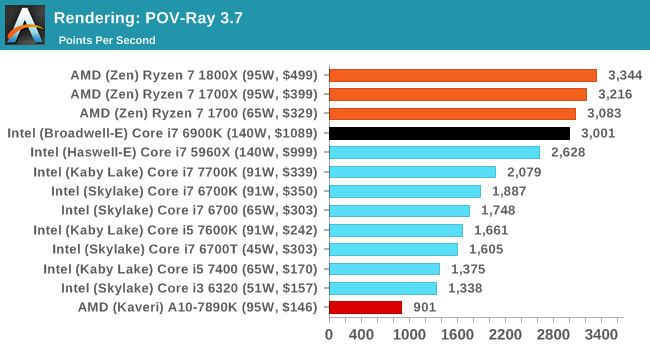
Cinebench R15
The latest version of CineBench has also become one of those 'used everywhere' benchmarks, particularly as an indicator of single thread performance. High IPC and high frequency gives performance in ST, whereas having good scaling and many cores is where the MT test wins out.
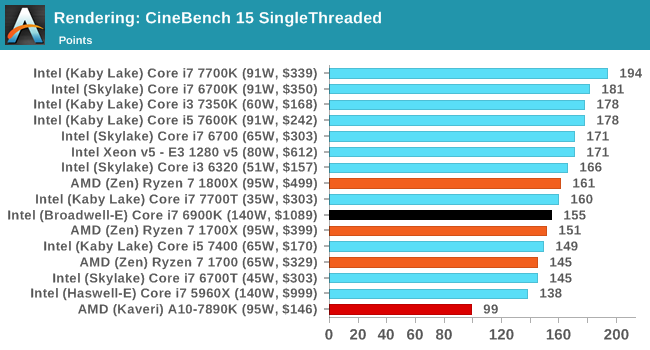
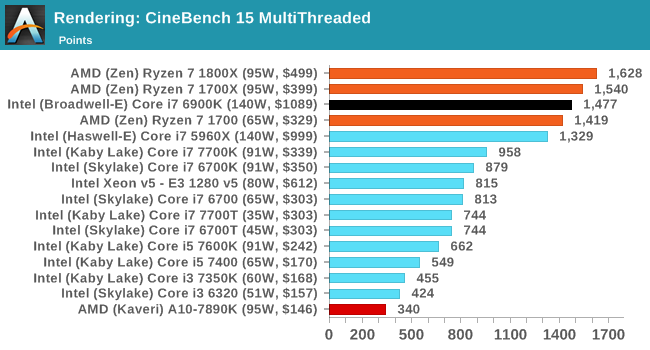


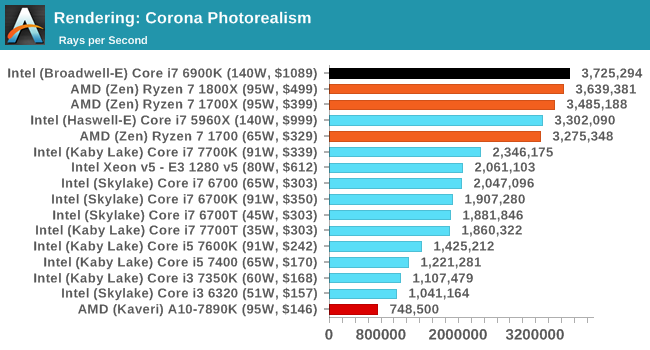
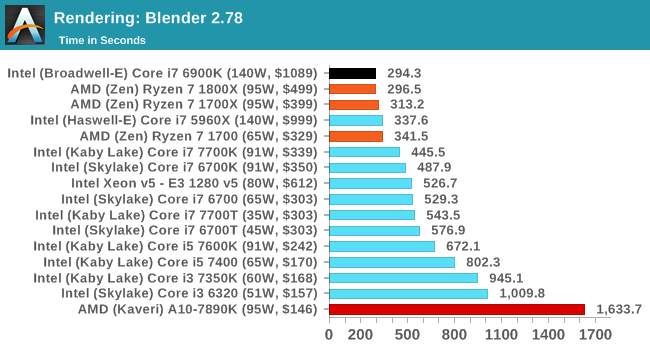
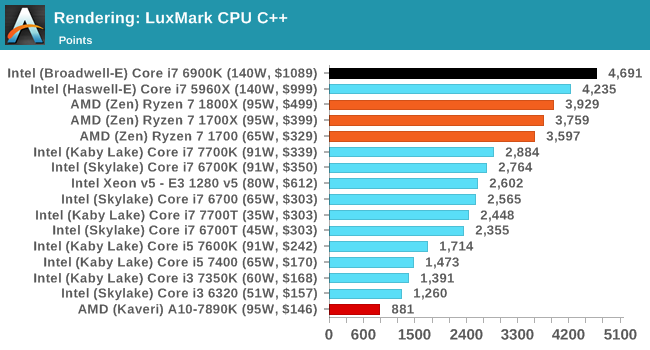
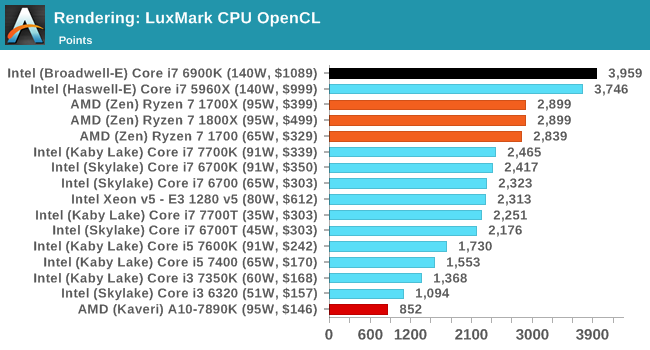








574 Comments
View All Comments
bobsta22 - Saturday, March 4, 2017 - link
Office with 20 PCs - all developers - loads of VMs and containers.All the PCs are due a CPU/Gfx refresh, but ITX mobos required.
Cant wait tbh. This is a game changer.
prisonerX - Saturday, March 4, 2017 - link
What if they come out with a 16 core line next year!bobsta22 - Saturday, March 4, 2017 - link
What?lilmoe - Tuesday, March 7, 2017 - link
It really is. As a freelance developer, I can't wait.ericgl21 - Saturday, March 4, 2017 - link
For me, the more important thing to see from AMD is if they can come up with a chip that can beat the mobile Core i7-7820HQ (4c/8t no ECC) & the Xeon E3-1575M v5 (4c/8t with ECC), for less money.And the number of PCIe gen3 lanes is very important, especially with the rise of M.2 NVMe storage sticks.
cmagic - Sunday, March 5, 2017 - link
Will anandtech review Ryzen in gaming? I would really like Anandtech view, since I don't really trust other sites especially those "entertainment" sites. Want to see how Anandtech dive into its main cause.Tchamber - Sunday, March 5, 2017 - link
@cmagicPage 15
2017 GPU
The bad news for our Ryzen review is that our new 2017 GPU testing stack not yet complete. We recieved our Ryzen CPU samples on February 21st, and tested in the hotel at the event for 6hr before flying back to Europe.
I just ordered my 1700X, I plan to keep it for at least 5 years, as my needs don't change much. My current Intel 6 core is coming up on 7 years old now. I like to buy high end and use it a long time.
Lazlo Panaflex - Monday, March 6, 2017 - link
Same here...probably gonna grab a 1700 at some point and put this here i5-2500 non-k in the kids computer.asH98 - Sunday, March 5, 2017 - link
'''The BIG QUESTION is WHY are the HEDT benchmarks (professional ie Blender) fairer than gaming benchmarks??Bottom line is that CUTTING-EDGE CODING is happening NOW in AI, HPC, data, and AV/AR, game coders because of $$$ are the last to change or learn unless forced (great for NVidia Intel) so most of the game coding is stuck in yesteryear- Bethesda will be the test bed for game coders to move forward
Hence the difference in game benchmarks vs 'professional' (HEDT) benchmarks. Game coders can get stuck using yesterday's code without repercussions and consequences as long as old hardware dominates and there are no incentives to change or learn new skills. The same Cant happen in the Professional area where speed is tantamount to performance and $$$
TheJian - Sunday, March 5, 2017 - link
I hope you're going to test a dozen games at 1080p where most of us run for article #2 and the GAMING article should come in a week not 1/2 year later like 1080/1070 gtx reviews...LOL. As this article just seems like AMD told you "guys, please don't run any games so we can sell some chips to suckers before they figure out games suck". And you listened. No point in testing 1440p or 4k for CPU, and 95% of us run 1920x1200 and BELOW so you should be testing your games there for a CPU test.The fact they are talking Zen2 instead of fixing Zen1 kind of makes me think most of the gaming is NOT going to be fixable.
http://www.legitreviews.com/amd-ryzen-7-1800x-1700...
149fps for 7700 in theif vs. 108 for 1800x? JEEZ. GTA5 again, 163 to 138. Deus ex MD 127 to 103. These are massive losses to Intel's chip and Deus was clearly gpu bound as many of Intel's chips hit the same 127fps including my old 4790k :( OUCH AMD.
https://www.guru3d.com/articles_pages/amd_ryzen_7_...
Tombraider same 7700k vs. 1800x 132fps to 114 (never mind 6850 scoring 140fps). This will probably get worse as we move to 1080ti, vega, nvidia refresh for xmas, Volta, 10nm etc. If you were using a faster gpu the cpus will separate even more especially if people are mostly gaming at 1080p. Even if many move to 1440p, that maybe fixes some games (tombraider is one with 1080 regular that hits a wall at 90fps), but again goes back to major losses as we move to 10nm etc. We get 10nm chips for mobile now and gpus probably next year at 12nm (real? fake 12nm? Either way) and might squeak into 2017 (volta, TSMC). 10nm gpus will likely come 2018 at the latest. Those gpus will make 1440p look like 1080p today surely and cpus will again spread out (and no, we won't all be running 4k then...LOL). You could see cpus smaller than 10nm BEFORE you upgrade your cpu again if you buy this year. That could get pretty ugly if the benchmarks around the web for gaming are not going to improve. One more point you'll likely be looking at GDDR6 (16Gbps probably) for vid cards allowing them to possibly stretch their legs even more if needed. Again, all not good for a gamer here IMHO.
“But Senior Engineer Mike Clark says he knows where the easy gains are for Zen 2, and they're already working through the list”
So maybe no fix in sight for Zen1? Just excuses like "run higher res, and code right guys"...I hope that isn't the best they've got. I could go on about games, but most should get the point. I was going to buy ryzen purely for Handbrake, but I'll need to see motherboard improvements and at least some movement on gaming VERY soon.
One more ouch statement from pcper.
https://www.pcper.com/news/Processors/AMD-responds...
"For buyers today that are gaming at 1080p, the situation is likely to remain as we have presented it going forward."
So they don't think a fix is coming based on AMD info and as noted as gpus get much faster (along with their memory speeds) expect 1440p to look like today's 1080p benchmarks at least to some extent.
The board part is of major interest to me, so I can wait a bit and also see Intel's response. So AMD has be hanging for a bit here, but not for too long. I do like the pro side of these though (handbrake especially, just not quite enough).